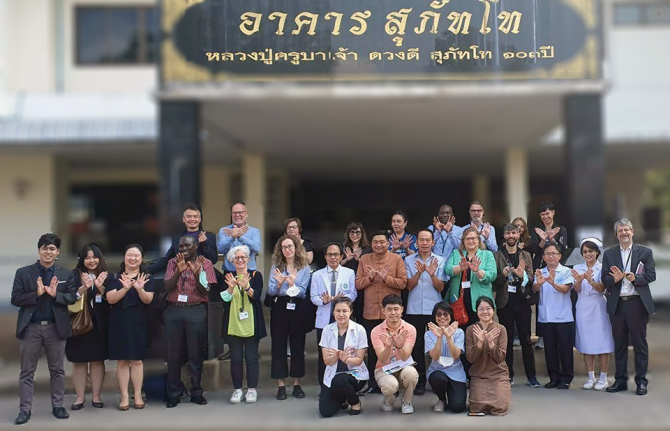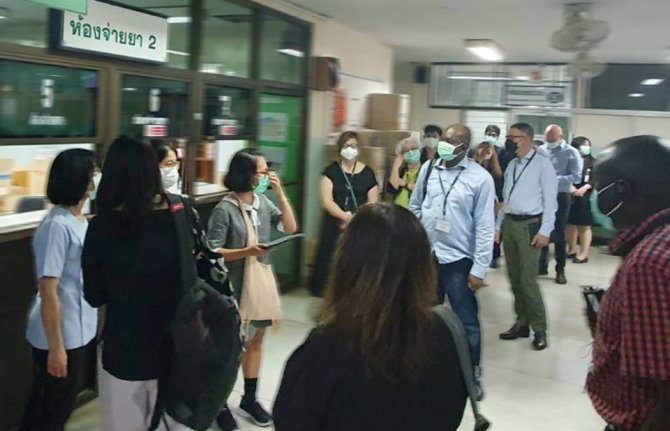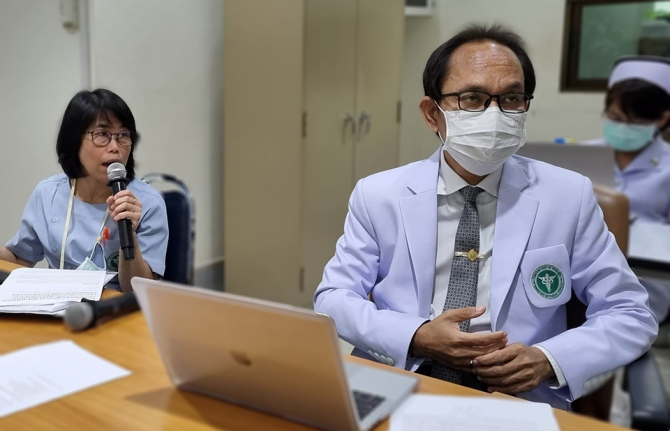



Feature Story
The power of bringing together government and community HIV services
15 December 2022
15 December 2022 15 December 2022The Sanpatong Hospital in North Thailand has reinvented and refined its HIV programme for more than three decades. It began attending to people living with HIV in 1989, and in 1996 started offering antiretroviral treatment.
“We have patients who have been with us for 30 years,” says Dr Tawit Kaewprasert, Deputy Director of Provincial Public Health Office and Director of Sanpatong Hospital.
In the last five years the hospital has not had a single case of mother-to-child HIV transmission. An impressive 96% of people on treatment who received viral load tests there this year were virally suppressed, with 98% of those patients being undetectable. Management speaks about the 92% retention rate for clients who were on treatment in 2022 in terms of how those results can be improved.
“We have not achieved that target just yet,” Dr Manusin Kongka says, referring to the proportion of people who stayed on antiretroviral therapy. “But we can reach the target and even achieve beyond 95%.”
The team even aims to achieve 100% viral suppression among people who have been on treatment for at least five years. The current 96% result isn’t considered to be good enough.
This ambitious goal-setting flows from the National HIV Policy and Thailand’s commitment to end AIDS by 2030 through a well-articulated strategy to reach, recruit, test, treat and retain people in care, while also working to prevent new infections.
Of course the strategy relies heavily on Sanpatong and institutions like it. This 130-bed facility boasts a central lab that serves surrounding hospitals in Chiang Mai, Lamphun and Mae Hong Son with HIV diagnosis, CD4, viral load monitoring and some opportunistic infections testing.
Their approach includes the adoption of HIV response best practices including PrEP, index testing and same-day treatment initiation.
“Patients can start treatment before they even get their CD4 result,” Dr Kongka explained.
All staff have received anti-stigma training as well as orientation around the U=U, undetectable = untransmittable, initiative. The facility uses a differentiated approach for antiretroviral treatment delivery. Depending on their health status, some clients can collect multiple month dispensing at district health promoting hospitals while others can receive their medicine by mail.
But a major key to Sanpatong’s success is the linkages it has made with groups of community-led organizations to drive case detection, linkage to care, psychosocial support and the monitoring of services. The Hospital works with Mplus, CAREMAT and FHI360 on prevention, testing and retention in care. Organizations of people living with HIV run support groups. The Community Led Monitoring team even helps primary care nurses to contact patients who have been lost to follow up and conduct home visits. The people living with HIV network collaborated with key community-based organizations in Chiang Mai to conduct community-led monitoring to improve the quality of HIV services at the Sanpatong hospital.
“Our collaboration with community organizations increases awareness about HIV, improves quality of care and access to care, decreases the waiting in community clinics and increases continuity of care for HIV patients,” said Ms Sineenuch Suwansre, HIV Coordinator.
This close collaboration with communities is enhanced by the Thailand Government’s move to integrate HIV services into the Universal Health Coverage scheme. Now certified organizations and lay HIV service providers can access domestic financial support within the national health infrastructure.
“Universal Health Coverage is a mechanism for the sustainable financing of HIV prevention as well as sustainable financial support to key population- and community-led health services. The Thai government’s move to fund Community-led Health Services as an element of the mainstream public health system is a win for people living with HIV, for HIV prevention and for sustainability,” said UNAIDS Thailand Country Director, Patchara Benjarattanaporn.



